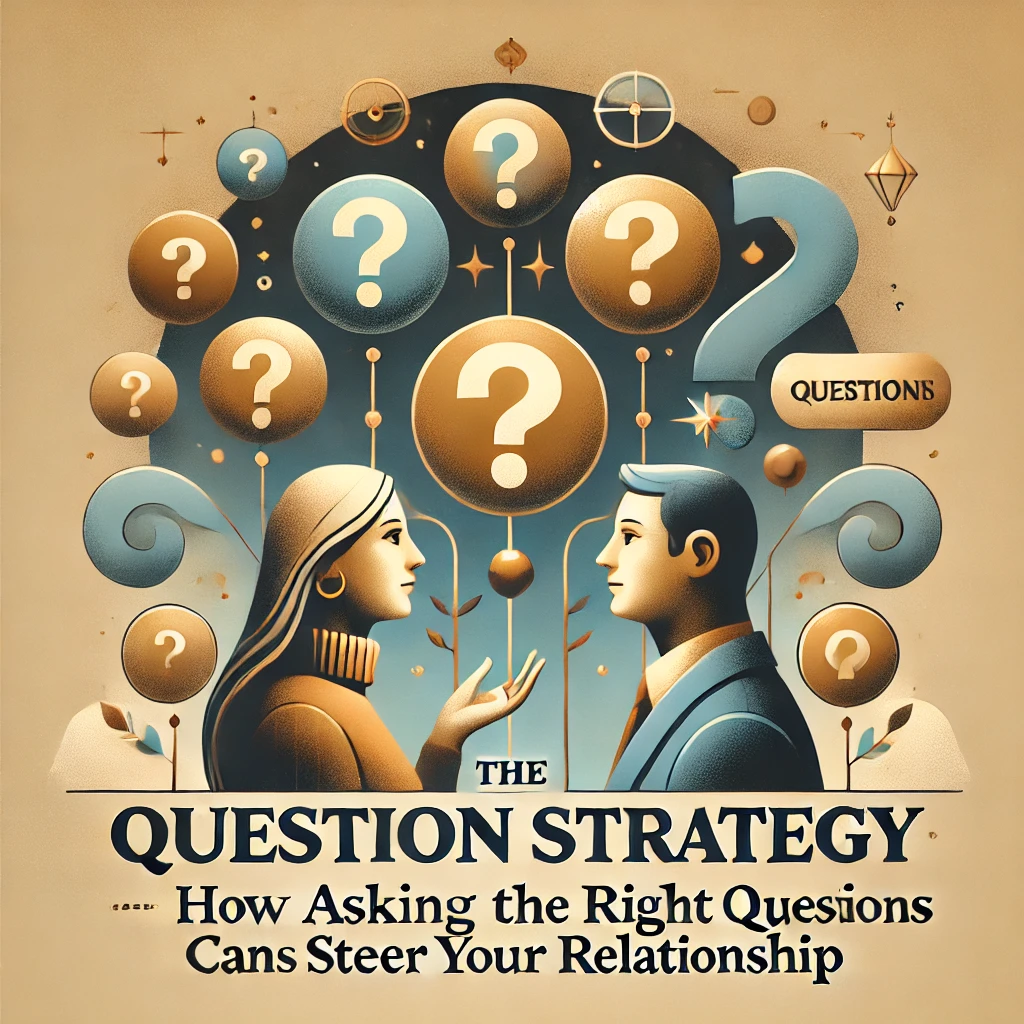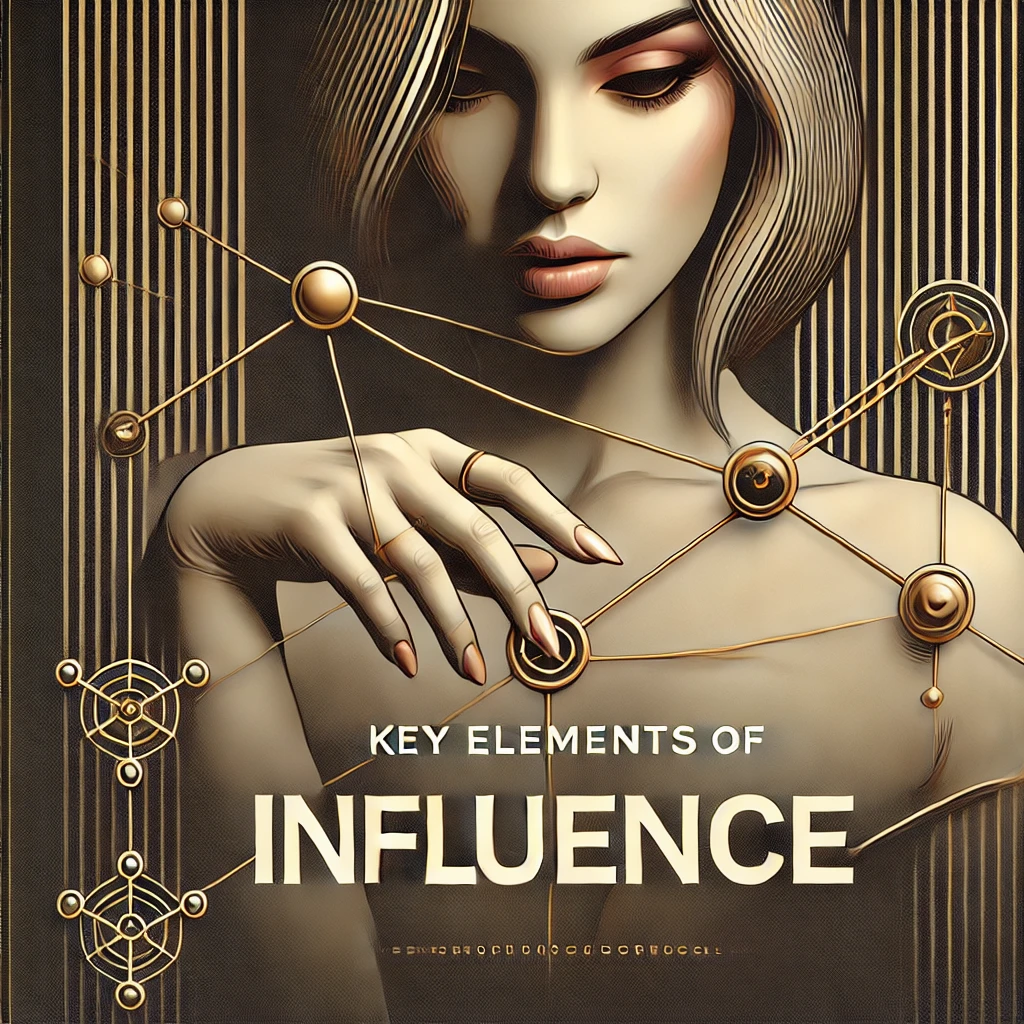In relationships, the way you communicate is everything. One of the most powerful yet often overlooked tools for influencing your partner and guiding conversations is the simple act of asking questions. Not just any questions—but the right questions. This is what’s known as The Question Strategy, a subtle technique that allows you to steer conversations, plant ideas, and gently influence your partner’s thoughts and actions, all while making them feel heard and empowered.
The Question Strategy works by using open-ended, reflective, or guiding questions to lead your partner toward a specific realization or outcome. Instead of making direct requests or statements that could lead to resistance, questions invite your partner to think for themselves and reach conclusions that align with your goals. When done right, the Question Strategy makes your partner feel like they’re making decisions on their own terms, even though you’ve been subtly steering the conversation all along.
In this blog, we’ll explore how the Question Strategy works, why it’s so effective in relationships, and provide relatable examples of how you can use it to influence your partner’s decisions without pressure or conflict. By the end, you’ll see how this technique can strengthen communication and help you gently guide the relationship in the direction you want.
What Is The Question Strategy?
The Question Strategy is the art of asking questions that gently guide your partner toward certain thoughts, ideas, or conclusions. It’s based on the idea that people are more likely to accept an idea when they’ve arrived at it themselves, rather than being told what to do. The right questions can plant seeds of thought, spark reflection, and create a sense of autonomy in decision-making.
Unlike direct statements, which can feel controlling or demanding, questions invite curiosity and conversation. They allow your partner to explore possibilities, reflect on their feelings, and ultimately arrive at a conclusion that feels like their own. This makes the Question Strategy a powerful tool for fostering cooperation and mutual understanding in relationships.
Why Does the Question Strategy Work?
The Question Strategy works because it engages your partner’s critical thinking and emotions without making them feel pressured. People naturally resist being told what to do, but they’re far more open to suggestions when they feel like they’re making the decision themselves. By asking questions, you give your partner the freedom to explore ideas, and in doing so, they become more open to change or influence.
This technique is also effective because it builds trust and rapport. Asking thoughtful, open-ended questions shows that you’re genuinely interested in your partner’s perspective. It fosters a sense of collaboration, where both partners feel involved in the decision-making process, even though you’re subtly guiding the conversation.
How to Use the Question Strategy in Relationships
Let’s dive into some practical, real-life examples of how you can use the Question Strategy to influence your partner’s thoughts, decisions, and actions in a way that feels natural and respectful.
Example 1: Encouraging a Healthier Lifestyle
You’d love for your partner to make healthier choices, but you know that directly telling them to change their habits won’t go over well. Instead of making demands, use the Question Strategy to gently lead them toward healthier decisions.
How to Use the Question Strategy:
Instead of saying, “You should eat healthier,” try asking, “Have you noticed how much more energized you feel after we have lighter meals? What do you think about trying some new recipes this week?” This question invites your partner to reflect on their own experiences, which makes them more likely to take action.
Why It Works:
The question doesn’t feel like a command. Instead, it encourages your partner to think about their own well-being, which makes them more receptive to the idea of healthier eating. They feel like they’re making the decision themselves rather than being told what to do.
Example 2: Steering a Big Decision
Maybe you and your partner are trying to make a significant decision—whether it’s buying a house, moving to a new city, or starting a family—but you have a clear preference for what you think is best. Rather than making your opinion obvious, you can use questions to gently steer the decision in your favor.
How to Use the Question Strategy:
Instead of saying, “I think we should move to [city],” ask, “What do you think are the biggest benefits of moving to a new city? How do you see our life changing there?” By asking reflective questions, you encourage your partner to consider the positive aspects of the option you prefer.
Why It Works:
These questions guide your partner to think about the decision more deeply, but without the pressure of being told what to do. They’re more likely to lean toward the option you prefer because the questions have allowed them to explore the idea for themselves.
Example 3: Improving Communication During Conflict
Conflict is inevitable in any relationship, but the way you handle it can make all the difference. Instead of getting defensive or making accusations, the Question Strategy can help you navigate difficult conversations more effectively.
How to Use the Question Strategy:
During an argument, instead of saying, “You never listen to me,” try asking, “What do you think I’m trying to say right now? Can you help me understand your point of view better?” These questions shift the focus from blaming to understanding, which can de-escalate the conflict and foster better communication.
Why It Works:
Questions encourage your partner to reflect on the situation and their role in the conversation. It creates a collaborative environment where both of you are trying to understand each other, rather than simply trying to win the argument.
Example 4: Encouraging More Quality Time Together
You’ve been feeling like you and your partner haven’t been spending enough quality time together, but you don’t want to come off as needy or demanding. The Question Strategy can help you bring up the issue in a gentle, constructive way.
How to Use the Question Strategy:
Instead of saying, “We never spend time together anymore,” ask, “What do you think about us setting aside one night a week to do something fun together? What kind of activities do you think we’d both enjoy?” This question invites your partner to take part in the solution, rather than feeling criticized.
Why It Works:
The question opens up a dialogue about spending more time together without making your partner feel like they’re being blamed. By asking for their input on activities, you’re making it a team effort, which makes them more likely to engage in the idea.
Example 5: Suggesting a Lifestyle Change
Perhaps you’ve been thinking about making a lifestyle change—like traveling more, saving for a big purchase, or adopting a new hobby—but you’re unsure how your partner will react. Instead of proposing the idea outright, you can use the Question Strategy to test the waters.
How to Use the Question Strategy:
Ask something like, “What do you think about us saving up for a big trip next year? Where would you love to visit?” By framing the idea as a question, you’re opening up a conversation rather than making a statement that could lead to resistance.
Why It Works:
This approach makes your partner feel like they have a say in the decision, which increases their willingness to go along with the idea. The question is non-threatening and gives your partner the opportunity to get excited about the possibilities.
Why the Question Strategy Works in Relationships
The Question Strategy works because it allows your partner to feel like they’re in control of their own decisions. When people feel heard and empowered, they’re more likely to engage positively and openly in conversations. Instead of issuing directives or commands that could lead to pushback, asking thoughtful questions creates a sense of collaboration and mutual respect.
This technique also helps to build trust and strengthen communication. By asking questions, you show that you’re genuinely interested in your partner’s thoughts and feelings, which fosters deeper emotional connection. And because the questions are designed to guide the conversation toward a desired outcome, you’re able to subtly influence their decisions without creating conflict.
Tips for Using the Question Strategy in Your Relationship
Here are a few tips to help you use the Question Strategy effectively in your relationship:
- Ask Open-Ended Questions: Avoid yes or no questions. Instead, ask questions that encourage reflection, such as, “How do you feel about…?” or “What do you think we could do to improve…?”
- Stay Curious: Show genuine interest in your partner’s perspective. The more curious you are, the more open they’ll be to exploring ideas with you.
- Frame Questions Positively: Focus on questions that guide the conversation toward positive outcomes. For example, instead of asking, “Why don’t you ever help around the house?” ask, “What do you think we could do to make things feel more balanced?”
- Be Patient: The Question Strategy is a subtle technique that takes time. Give your partner the space to think and respond at their own pace.
Q&A:
- What is the Question Strategy in relationships?
The Question Strategy is the technique of using open-ended, guiding questions to subtly influence a partner’s thoughts, actions, or decisions by leading them to their own conclusions. - How can asking questions improve my relationship?
Thoughtful questions encourage open communication, help your partner feel heard, and allow you to steer conversations toward positive outcomes without direct confrontation. - What are examples of using questions to influence a partner’s decisions?
Examples include asking, “What do you think would be the benefits of trying [suggestion]?” or “How would you feel if we did [desired action]?” - How do I encourage my partner to make healthier choices without sounding controlling?
Use questions that invite reflection, like, “Have you noticed how energized you feel when we do [activity]? What do you think about doing that more often?” - Why does asking questions work better than giving direct advice in relationships?
Questions help your partner reach their own conclusions, reducing resistance and making them more receptive to ideas because they feel involved in the decision-making process. - How do I use the Question Strategy to resolve conflicts without arguing?
During conflicts, ask questions that promote understanding, such as “How can we both feel heard in this situation?” or “What would make you feel understood right now?” - What are the best types of questions to ask to influence a partner’s perspective?
Open-ended questions that encourage reflection, like “How would you feel about…?” or “What do you think would make us closer?” - Can the Question Strategy be used to get my partner to spend more time together?
Yes! Ask questions like, “What do you think about setting aside a night each week for us to do something fun together? What activities do you think we’d both enjoy?” - How does the Question Strategy help build trust in relationships?
By asking questions that invite open discussion, you show genuine interest in your partner’s thoughts, fostering mutual respect and deeper connection. - How can I ask questions without making my partner feel pressured?
Keep questions open-ended, avoid framing them as demands, and focus on genuine curiosity, ensuring your partner feels their opinion is valued.
Want to Master the Art of Influence in Your Relationship?
If you’re ready to take your influence skills to the next level and learn how to guide your partner’s decisions with ease, “Mastering Him: The Secret Art of Gentle Control in Relationships” is your ultimate guide. In Chapter 7, you’ll dive deeper into the Question Strategy and discover 12 other powerful techniques to subtly influence your partner’s behavior, decisions, and emotions.
Get your copy today and start mastering the art of influence in your relationship. It’s time to gently guide your partner toward the outcomes you want—without conflict or pressure.
Read more about the book: https://developmentpill.com/mastering-him-the-secret-art-of-gentle-control-in-relationships-a-guide-to-influence-hell-never-see-coming/
Book Link: https://www.amazon.com/dp/B0DKKGLZQ9
Book Link UK: https://www.amazon.co.uk/dp/B0DKKGLZQ9
You can find book Links for other regions in this post page: https://developmentpill.com/mastering-him-the-secret-art-of-gentle-control-in-relationships-a-guide-to-influence-hell-never-see-coming/



